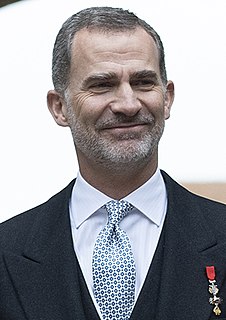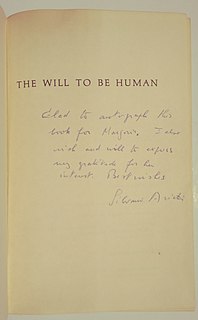A Quote by Albert Einstein
Today we must abandon competition and secure cooperation. This must be the central fact in all our considerations of international affairs; otherwise we face certain disaster. Past thinking and methods did not prevent world wars. Future thinking must prevent wars...The stakes are immense, the task colossal the time is short. But we may hope- we must hope- that man's own creation, man's own genius, will not destroy him.
Quote Topics
Abandon
Affairs
Central
Certain
Colossal
Competition
Cooperation
Creation
Destroy
Did
Disaster
Face
Fact
Future
Future Thinking
Genius
Him
Hope
Immense
International
International Affairs
Man
May
Methods
Must
Otherwise
Our
Own
Past
Prevent
Secure
Short
Stakes
Task
Thinking
Time
Today
Wars
Will
World
World War
Related Quotes
...art must must carry man's craving for the ideal, must be an expression of his reaching out towards it; that art must give man hope and faith. And the more hopeless the world in the artist's version, the more clearly perhaps must we see the ideal that stands in opposition - otherwise life becomes impossible! Art symbolises the meaning of our existence.
If abuses are destroyed, man must destroy them. If slaves are freed, man must free them. If new truths are discovered, man must discover them. If the naked are clothed; if the hungry are fed; if justice is done; if labor is rewarded; if superstition is driven from the mind; if the defenseless are protected, and if the right finally triumphs, all must be the work of man. The grand victories of the future must be won by man, and by man alone.
It seems to me that the dedication of a library is an act of faith. To bring together the resources of the past and to house them in buildings where they will be preserved for the use of men and women in the future, a nation must believe in three things. It must believe in the past. it must believe in the future. It must, above all, believe in the capacity of its own people so to learn from the past that they can gain in judgment in creating their own future.
In the past 20 years alone, it adds up to more death than were caused by all the civil and international wars adn government repression of the entire twentieth century, the century of Hitler and Stalin. How much would we give to prevent those horrors? Yet how little are we doing to prevent today's even larger toll and all the misery that it involves? I believe that if you read this book to the end, and look honestly and carefully at our situation, assessing both the facts and the ethical arguments, you will agree that we must act.
The person who experiences greatness must have a feeling for the myth he is in. He must reflect what is projected upon him. And he must have a strong sense of the sardonic. This is what uncouples him from belief in his own pretensions. The sardonic is all that permits him to move within himself. Without this quality, even occasional greatness will destroy a man.
We must learn to acknowledge that the creation is full of mystery; we will never entirely understand it. We must abandon arrogance and stand in awe. We must recover the sense of the majesty of creation, and the ability to be worshipful in its presence. For I do not doubt that it is only on the condition of humility and reverence before the world that our species will be able to remain in it.
Why is fear part of earth life? Perhaps our Heavenly Father’s greatest hope is that through our fears we may choose to turn to Him. The uncertainties of earth life can help to remind each of us that we are dependent on Him. But that reminder is not automatic. It involves our agency. We must choose to take our fears to Him, choose to trust Him, and choose to allow Him to direct us. We must make these choices when what we feel most inclined to do is to rely more and more on our own frantic and often distorted thinking.
We must not lose hope. Hope is an anchor to the souls of men. Satan would have us cast away that anchor. In this way he can bring discouragement and surrender. But we must not lose hope. The Lord is pleased with every effort, even the tiny, daily ones in which we strive to be more like Him. Though we may see that we have far to go on the road to perfection, we must not give up hope.
Creativity is not simply originality and unlimited freedom. There is much more to it than that. Creativity also imposes restrictions. While it uses methods other than those of ordinary thinking, it must not be in disagreement with ordinary thinking-or rather, it must be something that, sooner or later, ordinary thinking will understand, accept, and appreciate. Otherwise the result would be bizarre, not creative.
Lastly, we must be holy, because without holiness on earth - we will never be prepared to enjoy Heaven. ...I do not know what others may think - but to me it does seem clear that Heaven would be a miserable place to an unholy man. It cannot be otherwise. People may say in a vague way, that they "hope to go to Heaven, but they do not consider what they say. There must be a certain "fitness for the inheritance of the saints in light.
In whatever area in life one may meet the challenges of courage, whatever may be the sacrifices he faces if he follows his conscience - the loss of his friends, his fortune, his contentment, even the esteem of his fellow men - each man must decide for himself the course he will follow. The stories of past courage can define that ingredient - they can teach, they can offer hope, they can provide inspiration. But they cannot supply courage itself. For this each man must look into his own soul.
Each of our passions, even love, has a stomach that must not be overloaded. We must in everything write the word 'finis' in time; we must restrain ourselves, when it becomes urgent; we must draw the bolt on the appetite, play a fantasia on the violin, then break the strings with our own hand. The Wise man is he who knows when and how to stop.



































